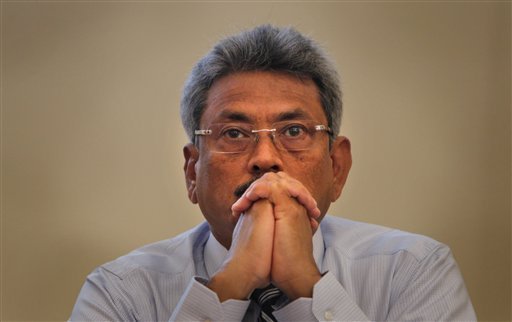
The International Truth and Justice Project (ITJP) have filed a criminal complaint to Singapore's Attorney General, seeking the "immediate arrest" of Sri Lanka's former president Gotabaya Rajapaksa for committing war crimes during the armed conflict.
In their legal complaint, the ITJP argues that Gotabaya Rajapaksa committed grave breaches of the Geneva Conventions during and in particular the final phase of the armed conflict while he served as Sri Lanka's Defence Secretary and these crimes are subject to domestic prosecution in Singapore under universal jurisdiction.
Rajapaksa fled to Singapore earlier this month after protesters stormed his official residence following months of protests calling for his resignation.
During his tenure as Defence Secretary, Rajapaksa oversaw the Sri Lankan government's military offensive which led to the massacre of tens of thousands of Tamils in May 2009. Tamils were forced onto tiny scraps of land and subjected them on intense shelling while makeshift hospitals and queues for food were bombed relentlessly.
The ITJP argue that Rajapaksa violated international humanitarian law and international criminal law and was responsible for overseeing "murder, execution, torture and inhuman treatment, rape and other forms of sexual violence, deprivation of liberty, severe bodily and mental harm, and starvation."
Speaking to Reuters, Alexandra Lily Kather, one of the lawyers who drafted the complaint said that the complaint is based on "verifiable information on both the crimes that have been committed, but also on evidence really linking the individual in question, who is now in Singapore."
“The concept of universal jurisdiction assumes there are certain crimes that are of concern to humanity as a whole and states have an obligation to prosecute them domestically regardless of where they were committed, against whom or by whom. This is an opportunity for Singapore to use its own laws in pursuit of justice and protect the world from a man who has a hideous history of gross violations of human rights against all the different communities of Sri Lanka. Serial perpetrators must face trial, not be issued visas.”
In a press release, the ITJP have outlined that the legal complaint includes "detailed evidence" to highlight that Rajapaksa issued direct orders to those serving as Major Generals at the time while he "watched the conduct of the battle live on surveillance and drone footage in headquarters."
Following the end of the armed conflict, in an interview with Sky News, Rajapaksa told reporters that contrary to international law, hospitals were legitimate targets, adding that "nothing should exist beyond the No Fire Zone”. These zones were repeatedly bombed by the Sri Lankan military. According to media reports, Rajapaksa watched the bombings of hospitals from the Operations Room.
“Such linkage information makes Gotabaya Rajapaksa complicit in the wilful killing of civilians and other heinous crimes, including torture, starvation and sexual violence committed in 2009,” Alexandra Lily Kather added.
Another civil lawsuit against Rajapaksa was filed by ITJP and Hausfield law firm in 2019 on behalf of Tamil torture survivor, Roy Samathanam. Samathanam was physically and psychologically tortured for three years after being detained in Colombo in September 2007. He was only released in August 2010 after signing a false confession and accepting a plea deal. He won a case against the Sri Lankan government at the UN Committee Against Torture but the Sri Lankan government did not comply with the order for compensation.
The case was later withdrawn after Rajapaksa was elected as President and was granted head of state immunity.
